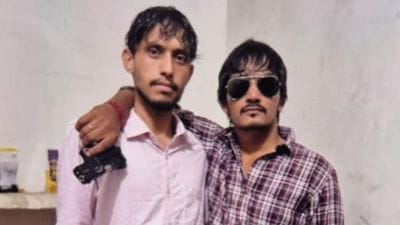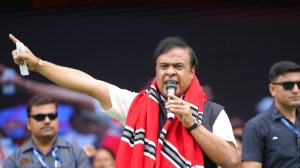Defeat is a jigsaw puzzle
Was it possible that they could swallow that?’’ wondered Winston Smith, the hero of George Orwell’s Nineteen Eighty Four afte...

Was it possible that they could swallow that?’’ wondered Winston Smith, the hero of George Orwell’s Nineteen Eighty Four after a particularly egregious bit of governmental spin. Similar thoughts were probably going through the minds of BJP leaders before elections after ruling for six years. The BJP asked India’s voters to swallow two things: one, economic reforms and, two, its new image of being pluralistic. Most people rejected both. The realities on the ground were different.
Development, the slogan coined for economic reforms, is something to the liking of nations. But the question is: What kind of reforms and for whom? It is not a secret that the affluent have creamed off reforms that the Vajpayee government has effected. Everywhere in the world, globalisation has benefited the rich. India is no exception. But they do not have a backlog of 600 million poor. Here the policies could have been framed in such a way that surplus hands were absorbed while switching over to advanced machines. A remark by a graduate at Hyderabad is quite telling: New companies have come up. Computers have been installed. But where are the jobs? Unemployment is a major concern in the country. Most of the 60 per cent of the youth who have cast their votes are unemployed. Apparently, Vajpayee’s promise to create 10 million jobs a year has been part of the rhetoric.
The BJP suffered most in the rural areas where the number of the landless, according to the Planning Commission, has gone up to 100 million. Consumption in villages has decreased against an increase of 30 per cent in cities. The ratio of the population is, however, the reverse: 70 per cent live in rural areas and 30 per cent in urban. If India is to grow into a performing democracy, it will become necessary to discard or alter those aspects of the system which inhibit the attainment of distributive justice in a framework of freedom.
The BJP could not have possibly sold its conversion to pluralism in such a short time. And the presence of Gujarat Chief Minister Narendra Modi at several election campaigns gave the game away. The spirit of accommodation vis-a-vis him was the party’s undoing. Had the Supreme Court’s strictures against Modi led the party to dismiss him, the Muslims and the liberals would have queued up to vote for the BJP. Imagine how Vajpayee’s popularity ratings would have soared if he had asked Modi to quit.
BJP President Venkaiah Naidu’s emphasis on ‘‘ideology’’ in post-election speeches says it all. He and other BJP leaders have not yet realised that India has rejected Hindutva. If the BJP were to analyse the election results, it would know that Hindutva had not many takers. The undercurrent which Sushma Swaraj has said was running against her party was the people’s anger against Hindutva, expressed openly and surreptitiously. They did not like the saffronising of the country and the undoing of its pluralistic ethos of centuries.
A preponderant number of Hindus have felt small even over the manner in which the BJP and other members of the Sangh Parivar have disfigured Hinduism, from its image of tolerance to fanaticism. The Telegu Desam’s rout in Andhra Pradesh is one example. The party’s secular credentials, already suspect after its outside support to the Vajpayee government, came to be questioned much more this time because it had allied openly with the BJP.
I was horrified to hear Mukhtar Abbas Naqvi, one of the BJP’s general secretaries, remark before the counting of votes that his party had projected peace and development and that if it did not succeed, it would have to reconsider the policy. Is he threatening that the BJP will go back to Hindutva with a vengeance? By all means, the party can do that, and it probably will. But this is not going to help the party.
What the BJP should learn from the polls is that by flaunting such threats it is only proving that power had gone to its head. Pride has a fall. This is true as much of political parties as of individuals. The arrogance of power has pulled down the BJP. Here was a party, although annoyingly parochial in its outlook, known for humility. Leaders were modest and unassuming. A touch of power changed their deportment in no time. They were a different lot when they became rulers, hawkish, hot and haughty. Cockeyed and complacent, they did not think that they owed the nation explanations for their acts of omission and commission, drift and failure.
I have experienced in the Rajya Sabha the contempt with which the BJP leaders treated members. I would particularly mention the name of Pramod Mahajan. He behaved as if he lorded it over the rest of us. He was then minister for parliamentary affairs. He had convinced himself that MPs needed him, not that he needed them. He excluded those he did not like from parliamentary select committees. Atal Bihari Vajpayee would not even acknowledge letters of protest against Mahajan.
L.K. Advani, whom I met first as a struggling journalist, wore power on his sleeve. POTA is his handiwork. He had the traffic stopped the other day because he was receiving his daughter at Palam. Even Jaswant Singh, leader of the Rajya Sabha, seldom took the initiative to talk to lesser members. Murli Manohar Joshi exuded self-righteousness. He had only one mission: How to destroy the educational and cultural institutions which bore the name of Mahatma Gandhi.
Still, these are the people who represented the “shining” India. They spent $20 million from the exchequer on advertisements to stay “shining”. How many schools, health centres and night shelters could have been built with this amount? The BJP behaved as if it could not care less what it was doing with public money.
I expected Vajpayee to discipline his flock. But he was busy placating the RSS leaders on the one hand and keeping his coalition of 24 parties in tow on the other. His admission in a recent interview that it was better to coalesce with “larger” parties tells a sad story of his desire and helplessness. This time he at least did not have to undergo the humiliation of seeking the support of even one-member parties.
Photos





- 01
- 02
- 03
- 04
- 05


























